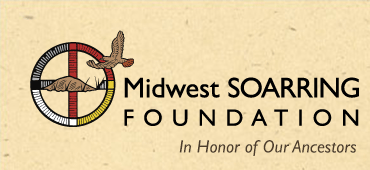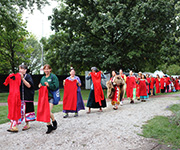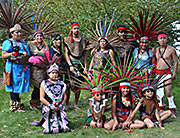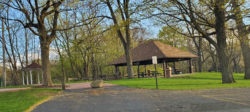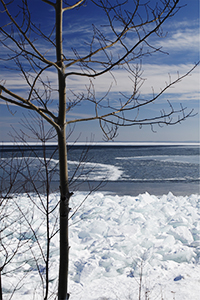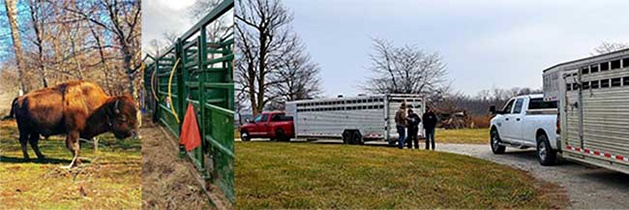
MSF bison relocation to Cherokee Nation Oklahoma
Twenty-five years ago, I received word of a lone bison that was soon to be slaughtered. She was the last of a herd of thirteen located in Will County, Illinois. I immediately wanted to save her and contacted the farmer. Upon seeing her, I knew Midwest SOARRING Foundation would find a way to protect her life. Little did I know this would be the beginning of a twenty-five year mission to save many of these great herbivores.
The day arrived to move this lone bison to her new location. The truck backed up close to the corral to be near the make-shift loading ramp the farmer had constructed. Half way up the ramp, the bison became stuck between the rails. The farmer instructed me to climb to the top of the fence and handed me a broad board. He told me to give her a light tap. When I did, the bison expressed her unhappiness with a bellow and a kick, and bounded into the truck. Since one of her horns was broken in a fight with a male, I named her Broken Horn, Midwest SOARRING Foundation’s first bison. (I learned later that bison will regrow a new horn.)
Broken Horn’s destination was the Grand Village of the Kickapoo Nation in LeRoy, Illinois. Bill and Doris Emmett and their daughter Peggy were the owners of the property. Earlier, Midwest SOARRING Foundation had assisted them in saving the Native American historic site. The family welcomed Broken Horn to their land. In appreciation for the preservation of the site, and in honor of its importance to Native American culture, SOARRING sponsored the first Return of the Grand Village of the Kickapoo Nation Pow Wow to their village site. This was a moving and successful event for everyone, as the Kickapoo Nation had not gathered together as a tribal nation for many years.
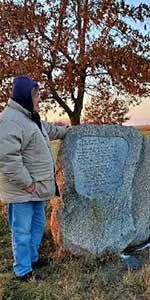
Joseph and Grand Village of Kickapoo historical plaque
As the years went on, SOARRING acquired additional bison. Several were donated by individuals and four came from Lords Park in Elgin, Illinois–two sisters one year, two brothers the next. In the spring our herd annually produced calves. Bill and Doris also started their own herd, which banded and bred with ours, promoting a healthy genetic diversity. Throughout the seasons, it was gratifying to see the bison prosper in the tall grass and the calves frolic with their mothers. Sometimes there were several unexpected bison breakouts when the fencing had to be repaired from storm damage.
From the beginning our vision was to care for our herd as a spirit herd–they were not being raised for meat consumption. For thousands of years the bison on Turtle Island provided meat, hides, and tool implements for Native people’s survival. In honor of all they had given us, I decided that a spirit herd would be a thank you to the Bison Nation. I also hoped to inspire reverence and respect for these noble creatures that once roamed throughout North America, and one day, to return them to the freedom of the open plains to share their strength with others of their kind.
Eventually Bill retired after his wife died and sold both his property and bison. The new owners, Bill and Misty Vermatt, and their son Ricky and daughter Jackie, were eager to assist us in our bison endeavor. I must acknowledge Bill’s tremendous efforts over fourteen years to provide strong fencing, consistent water, hay and cracked corn to supplement their winter diet, as well as
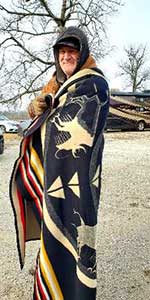
Farmer Bill gifted blanket from MSF for his care of the bison
burying them when they passed. Every year a Grand Village Kickapoo Pow Wow was held, complete with a bison viewing wagon ride, when thrilled visitors of all ages were deeply awed seeing real bison up close for the first time in their lives. My late wife, Janet, always insisted on buying bags of apples so she could throw them to the bison during the bison rides.
This past year Bill and Misty decided to retire and sell their property which challenged us to find a new home for the herd with their eventual return to their ancestral homeland on the open plains. In June of 2020, our search began in earnest. Dave Nordin, an associate board member and I worked tirelessly on this every day. We made many phone calls and contacts to find a suitable location, with the understanding that the bison would be maintained as a spirit herd. We reached out to many bison people, each with their own goals. Some wanted to take a portion of the herd for breeding purposes, but not the big bulls. In my mind it had to be all or nothing -we would not break up the herd and abandon the bulls to an uncertain fate.
In September 2020, we began to work with Megan Davenport, staff biologist of the Intertribal Buffalo Council (ITBC) in Rapid City, South Dakota, to explore a possible tribal relocation. ITBC is an organization which matches available bison with tribes seeking to promote healthy management and growth of herds under their care by adding greater genetic diversity, helping to ensure that the species will thrive. After months of research, we found a suitable new home for our herd with the Cherokee Nation of Oklahoma. Next, on the recommendation of State Senator Troy Heinert of South Dakota, a multi-talented member of the Rosebud Sioux Tribe with experience in the unique logistics of bison relocation, we engaged Matt Noble and his crew, who were experienced large animal movers.
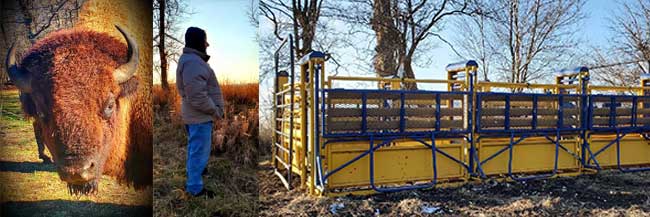
Joseph Standing Bear and Spirit Bison herd relocation to Oklahoma
At the bison pasture in LeRoy, Illinois on December 18, 2020 Matt and his crew installed the necessary corral, chute and squeezer apparatus which would allow the veterinarian we selected, Dr. Tessa Marshall of the University of Illinois veterinary faculty and a bison expert with her assistant, to visually inspect and tag each animal for interstate transport. They were then loaded on the two trucks which would carry them to their new home and destiny. The actual loading of the animals took five hours from start to finish. Matt and his crew worked like a well -oiled machine, and no animals or people were hurt.
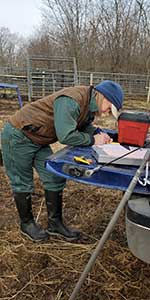
Veterinarian Dr. Marshall
The first to be loaded was the biggest male and the last was the youngest male calf. This youngster proved to be the hardest to lead into the enclosure as he darted around the pasture and in between the thorn trees and was the last to enter the trailer–echoing the spirit of Broken Horn. The vet, Dr. Marshall was prepared to use her tranquilizer gun, yet Bill was able to chase the calf into the enclosure. The trucks traveled non- stop to Oklahoma and reached the Cherokee reservation Friday evening, Dec. 18, 2020 at 11:30pm. Now, they reside on 1,000 acres with 150 other bison the Cherokee had recently acquired. This substantial gift from Midwest SOARRING Foundation to the Cherokee Nation completed our twenty-five year vision of returning the bison to the prairie. We very much appreciate Raven Fyreheart‘s photographic expertise documenting our story.
In closing, I humbly ask for your donations to help us pay for the expenses not covered by the ITBC, completing our mission to return the bison to their ancestral range and to preserve and share the record of their story. We successfully negotiated for the Intertribal Buffalo Council to pay for the trucks, drivers, fuel and veterinarian fee, which left the remaining costs to Midwest SOARRING Foundation to cover. These will include the costs of renting, setting up and taking down of the extensive heavy duty equipment needed to load an entire herd of bison. It will also include the fees for a professional documentary film crew to record the Grand Village of the Kickapoo, the bison, and the loading process and the cost to edit the raw footage into documentary format. There will be additional costs of creating, attending and recording the ceremony of acknowledgment and appreciation from the Cherokee Nation to Midwest SOARRING Foundation hopefully in the summer, depending on the COVID status. We would like to raise $20,000. Your donations will cover all costs of the documentary production including editing, our travel expenses, and incidentals –costs not covered by ITBC. You can donate here.
I give thanks to the Creator for this opportunity and bless our bison nation for their continued care and well- being.
Regards,
Joseph Standing Bear Schranz
